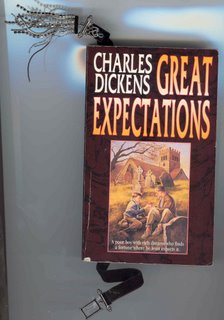
Okay, so the title of this post is a quote from a KISS song, "Great Expectations." My guess is that Gene Simmons got the idea from Charles Dickens' wonderful novel, but his conception of "expectations" is a tad different from the author's.
I'm finally reading this entire book, and I love it. Maybe I'm identifying too much with the protagonist, Pip, a young insecure man who finds himself in love with a cold woman who makes him miserable. Hmm. Pip grows up poor, raised by his grim older sister, Mrs. Joe, and her loving, underappreciated husband, Joe. In the justly famous first chapter, Pip visits the graves of his parents, only to be violently threatened by a convict, who has escaped from a prison ship in the bay nearby despite the leg irons that bind his feet. The convict, whom we learn later is named Magwitch, literally shakes Pip into promising to bring him food and a file. Dickens really knows how to start things off with a bang.
Pip helps Magwitch with a stolen pie and a file from Joe's smithy, only to see the man recaptured and taken back to the prison ship. That, he supposes, is that last he'll ever see of the man, and he tells no one how he took pity on a convict.
The wealthy neighborhood eccentric, Miss Havisham, asks to have Pip come visit her every week, and here we meet one of the craziest women ever to inhabit a book. Many who have never read Dickens still nod in recognition when you describe Miss Havisham. Miss H was abandoned by her fiance on the day of her wedding, so she has kept her house exactly as it was at the very moment of her humiliation. She wears nothing but her yellowed wedding dress, and gets her exercise only by walking around her drawing room, arm in arm with Pip, or by training her young ward Estella to break men's hearts. Thus she hopes she will gain revenge on all men. Poor Pip is the young man Miss H uses as a subject for Estella's tutelage. From the first he is entranced by Estella, who, although beautiful, is a consummate snob. When she insults his big, dirty boots, Pip conceives a sudden and almost debilitating hatred for himself and his poor upbringing.
Years pass, and Pip's obsession with Estella only grows with her beauty and her disdain. Mrs. Joe suffers a mysterious attack and needs constant care, bringing the warm-hearted Biddy into Pip's life. Biddy may love Pip. I'm not sure yet. Dickens excels at subtext, even as the text itself gives you an almost cinematic feel for the setting and characters. But Biddy also knows Pip better than Pip himself. She sees his yearning for a life above his station, and she knows she can never fit into his life so long as he wants the unobtainable Estella.
Then the bombshell falls -- Pip inherits a huge sum of money from a benefactor who insists on remaining anonymous. Famous attorney Mr. Jaggers is to administrate, and Jaggers and his assistant, Wemmick, are intricate characters who, along with Biddy and Joe, are also deeply good at heart. Part of my fascination for this book lies in how Dickens makes the good characters so complex and fascinating. Wemmick, for example, so scrupulously divides his life between business and personal such that he will offer Pip only the most pragmatic advice while in his office, but once at home with his deaf father, affectionately referred to as the Aged, he helps Pip as only the best of friends could.
Pip begins a rich life without real purpose once the money rolls in. His obsession with Estella grows all the more pronounced when she reappears all grown up and more beautiful than ever. Yet he remains forever miserable in her company. She treats him with nothing but coolness and distance, and yet his greatest wish is to marry her and forever subject himself to her. When I saw the movie version of this book, directed by David Lean, this was the part of the story I found most unbelievable -- and this in a book full of strange twists of fate! But reading brings a quite different perspective, as do life lessons, and I can see now just how a person like Pip could hang onto the very thing that makes him miserable as if it were the most important thing in the world. Dickens demonstrates an extraordinary understanding of psychology -- how insecurity and self hatred can lead to co-dependence. If we feel worthless enough we will go to any lengths to help and hang onto the person whose terrible treatment cripples us even further.
On top of all this, Dickens is downright funny. His sense of the absurd is acute. Here's a quote about Pip's sister and abusive caretaker:
"Mrs. Joe was a very clean housekeeper, but had an exquisite art of making her cleanliness more uncomfortable and unacceptable than dirt itself. Cleanliness is next to Godliness, and some people do the same by their religion."
Notice Dickens does not condemn all relgious folks -- just those whose grim obsession make their beliefs untenable to the rest of us.
I'm about to hit a major plot twist in this saga, wherein, I believe, Pip discovers that it wasn't Miss Havisham who gave him his "great expectations" at all. His benefactor is instead... Magwitch, the convict he helped when he was a lad, the very sort of man the now snobby Pip would be most ashamed of associating with. It's a delicious turn of events. I wish I didn't have plans tonight so I could really dig in as soon as possible.
No comments:
Post a Comment